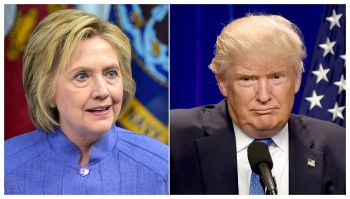“Let us . . . bind up the nation’s wounds,” the founder of the party of Lincoln exhorted his fellow countrymen in his brief second inaugural address in March 1865. “It is time for America to bind the wounds of division,” the current standard-bearer of Lincoln’s party told the nation in the wee hours of Wednesday morning.
I don’t know if Donald Trump was consciously echoing Abraham Lincoln in his victory speech, but it strikes me as possible, perhaps even likely, given how much the president-elect admires Lincoln. Trump’s aides have noted that “Abraham Lincoln is going to be an important figure in terms of Mr. Trump’s vision for the Republican Party,” while Trump himself has paid eloquent tribute to his predecessor. As he explained to columnist Bob Woodward, Lincoln was
. . . a man that did something that was a very vital thing to do at that time. Ten years before or 20 years before, what he was doing would never have even been thought possible. So he did something that was a very important thing to do, and especially at that time.
Did you follow that?
I’d consider it a personal favor if Mr. Trump never referred to Lincoln again or repeated his words. As a historian and a lifelong Republican, anything that intentionally juxtaposes Abraham Lincoln and Donald Trump is just too painful. But beyond the personal discomfort that it causes, Mr. Trump needs to understand that quoting a past president doesn’t make him “presidential.”
Context matters.
When Abraham Lincoln spoke of binding the nation’s wounds, he was referring to a rending in the national fabric that he saw as wholly unnecessary and which grieved him deeply. As a polarized nation careened toward war at the close of the 1850s, the antislavery Lincoln repeatedly told antislavery audiences that they were not morally superior to slaveholding white southerners.
“I have constantly declared, as I really believed,” Lincoln told an Illinois audience in October 1858, that “the only difference between them [the white South] and us, is the difference of circumstances.” In an 1859 speech in Dayton, Ohio, Lincoln figuratively addressed the South with this promise: “We mean to remember that you [Southerners] are as good as we; that there is no difference between us other than the difference of circumstances. We mean to recognize and bear in mind always that you have as good hearts in your bosoms as other people, or as we claim to have.”
In the process, Lincoln was indirectly admonishing his own followers to avoid self-righteousness and to treat their opponents charitably. Addressing members of his own party, Lincoln imparted this advice:
It is exceedingly desirable that all parts of this great Confederacy shall be at peace, and in harmony, with one another. Let us Republicans do our part to have it so. Even though much provoked, let us do nothing through passion and ill temper. Even though the southern people will not so much as listen to us, let us calmly consider their demands, and yield to them if, in our deliberate view of our duty, we possibly can.
Even as Union men were dying on the battlefields of Virginia and Tennessee, Lincoln resisted efforts to portray his southern enemies as either stupid or evil, and when northern clergymen would advise him to assure the North that the Lord was on their side, Lincoln consistently demurred.
In sum, when Lincoln famously called for reconciliation in his second inaugural–“with malice toward none, with charity to all”–his plea represented the logical culmination of a humble, gracious, charitable civility that had characterized his public rhetoric for years past. Mr. Trump, in contrast, has for years sought intentionally to divide the nation as a conscious political strategy. His language has been caustic, defamatory, reckless, unthinking, bombastic, anti-intellectual, and relentless self-aggrandizing.
Historically, it would be accurate to call him the anti-Lincoln. Pretty soon, we’ll just call him “Mr. President.”












